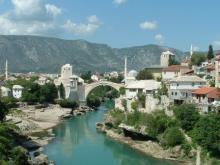Sarajevo, Zagreb, and Belgrade, Bosnia, Croatia, and Serbia
Outsiders have viewed the Balkans as a zone where religious and cultural differences breed sectarian violence and where competition between empires East and West compounds instability and conflict.
Five previous programs in the Balkans and recent scholarship on the region, offer an alternative account, of religious and cultural coexistence as the norm through much of the region during the early modern period and in the former Yugoslavia after World War II. If peace has sometimes broken down along religious and ethnic lines, the peace has often held across them in spite of great power competition and interventions.
Through close study of the Yugoslav conflict and of the post war peace in Bosnia-Herzegovina (BH), and Serbia, we will ask ourselves how best to understand Balkan myths and realities and where they shed light on why at times the peace has held and at others has broken.
Through coursework, guest lecturers, tours, meetings with local diplomats, NGO workers and students, as well as informal contacts, we will expose ourselves to a broad spectrum of perspectives and methods of study. Often we will be negotiating both the disintegration created by the conflict and the emerging connections that link these areas of the Balkans together. Students will complete and present the findings of a major paper reflecting a topic or question which they have examined in detail over the course of the program and which compares their findings across our sites of study.
Pre-departure Seminar
Participants will be required to attend a 2 credit pre-departure class that will meet approximately once per week during spring quarter.
CHID 471 A: Contemporary Bosnia, Croatia and Serbia (5 credits)
The overall goal of this course is to develop an understanding of the history, politics, economy, education, culture and presence of the international community in the wars of the 90’s and postwar developments in the former Yugoslavia. Each of these elements is critical to an understanding of the prospects for sustainable peace, prospects for national reconciliation and for regional cooperation and development.
CHID 471 B: Cultural Communication in the former Yugoslavia (5 credits)
The overall goal of this course is to develop an understanding of the process of communicating across cultural boundaries in the former Yugoslavia region. We will assume that culture is both a product of communication processes and a producer and shaper of communication forms and content. The contribution of communication processes to the forms and content of communication plays an essential role in prospects for continued reconciliation and development in the former Yugoslavia. We will place special emphasis on how the Yugoslav Ideal anchored inter-cultural communication during much post-WW II Yugoslavia and the crucial role now played by ethno-nationalist conceptions of group identity, changed conceptions of intercultural boundaries and communication within and across them.
ENGLISH 490: Contemporary Bosnian, Croatian and Serbian Literature (5 credits)
The goal of this course is to develop an understanding of approaches to literature adopted by writers from the Balkans, specifically those writing in the context of Yugoslavia I and II, the legacy of Yugoslav conflict and the contemporary states and societies that have succeeded them. We will examine the competing conceptions of cultural and historical continuity and discontinuity in this literature and its role in articulating national and group identities.
We recommend that you check with your academic advisor to see how these classes can count towards your departmental requirements.
The program fee will cover instruction costs, housing, and transportation for required field trips.
The program fee does not cover: $250 IPE fee, airfare, meals, insurance or personal travel and expenses.
Make sure to read our Fees, Financing, and Withdrawal page for information on paying for your trip.
